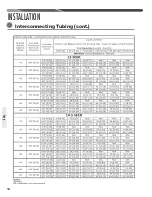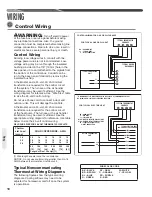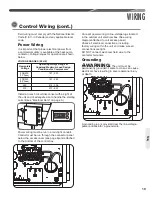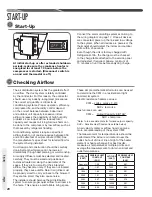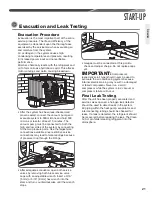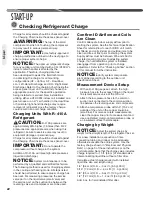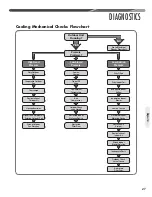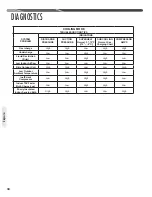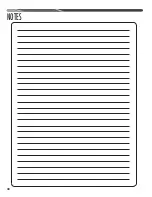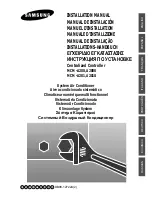
28
DIAGNOSTICS
General Troubleshooting Chart
WARNING:
Disconnect all power to
unit before servicing� Contactor may break only one
side� Failure to shut off power can cause electrical
shock resulting in personal injury or death�
SYMPTOM
POSSIBLE CAUSE
REMEDY
Unit will not run
• Power off or loose electrical connection
• Thermostat out of calibration – set too high
• Defective control board
• Blown fuses/tripped breaker
• Transformer defective
• High-pressure control open
• Miswiring of communications (communication
light on continuously)
• Check for correct voltage at line voltage connections in
condensing unit�
• Reset.
• Check control board diagnostic codes.
• Replace fuses/reset breaker.
• Check wiring. Replace transformer.
• Reset. Also see high head pressure remedy. The high-
pressure control opens at 610 PSIG�
• Check communication wiring.
Outdoor fan runs,
compressor doesn't
• Run or start capacitor defective
• Start relay defective
• Loose connection
• Compressor stuck, grounded or open motor
winding, open internal overload�
• Low-voltage condition
• Replace.
• Replace.
• Check for correct voltage at compressor. Check and
tighten all connections�
• Wait at least 3 hours for overload to reset. If still open,
replace the compressor�
• Add start kit components.
Insufficient cooling
• Improperly sized unit
• Improper indoor airflow
• Incorrect refrigerant charge
• Air, noncondensibles, or moisture in system
• Recalculate load.
• Check. Should be approximately 400 CFM per ton.
• Charge per procedure attached to unit service panel.
• Recover refrigerant. Evacuate and recharge. Add filter
drier�
Compressor short
cycles
• Incorrect voltage
• Defective overload protector
• Refrigerant undercharge
• At compressor terminals, voltage must be ± 10% of
nameplate marking when unit is operating�
• Replace. Check for correct voltage.
• Add refrigerant.
Registers sweat
• Low indoor airflow
• Increase speed of blower or reduce restriction.
Replace air filter.
High head, low vapor
pressures
• Restriction in liquid line, expansion device, or
filter drier
• Bad TXV
• Remove or replace defective component.
• Replace TXV.
High head, high
or normal vapor
pressure – Cooling
mode
• Dirty outdoor coil
• Refrigerant overcharge
• Outdoor fan not running
• Air or noncondensibles in system
• Clean coil.
• Correct system charge.
• Repair or replace.
• Recover refrigerant. Evacuate and recharge.
Low head, high vapor
pressures
• Bad TXV
• Bad compressor
• Replace TXV.
• Replace compressor.
Low vapor, cool
compressor, iced
indoor coil
• Low indoor airflow
• Operating below 65°F outdoors
• Moisture in system
• Increase speed of blower or reduce restriction.
Replace air filter.
• Add Low Ambient Kit.
• Recover refrigerant. Evacuate and recharge. Add filter
drier�
High vapor pressure
• Excessive load
• Defective compressor
• Recheck load calculation.
• Replace.
Fluctuating head and
vapor pressures
• TXV hunting
• Air or noncondensibles in system
• Check TXV bulb clamp. Check air distribution on coil.
Replace TXV�
• Recover refrigerant. Evacuate and recharge.
Gurgle or pulsing
noise at expansion
device or liquid line
• Air or noncondensibles in system
• Recover refrigerant. Evacuate and recharge.
Diagnostics
Summary of Contents for ANL-AZ 13 SEER Series
Page 12: ...12 INSTALLATION Interconnecting Tubing cont Tubing...
Page 13: ...13 INSTALLATION Interconnecting Tubing cont Tubing...
Page 14: ...14 INSTALLATION Interconnecting Tubing cont Tubing...
Page 35: ...35 For Single Phase Models WIRING DIAGRAMS Wiring Diagrams...
Page 36: ...36 WIRING DIAGRAMS For Three Phase Models Wiring Diagrams...
Page 37: ...37 Wiring Diagrams APM 018 WITH ECM FAN MOTOR WIRING DIAGRAMS...
Page 38: ...38 NOTES...
Page 39: ...39 NOTES...
Page 40: ...40 NOTES...

